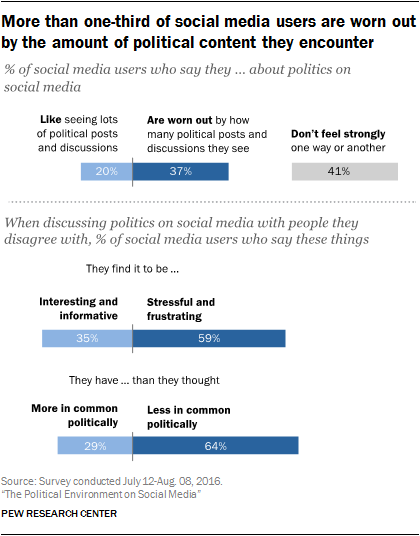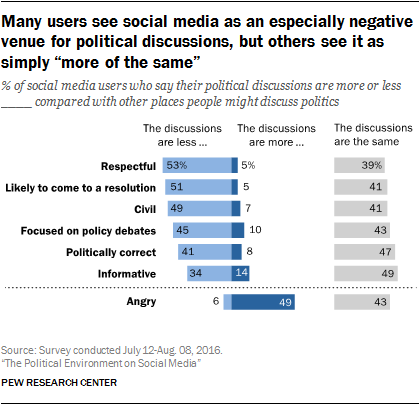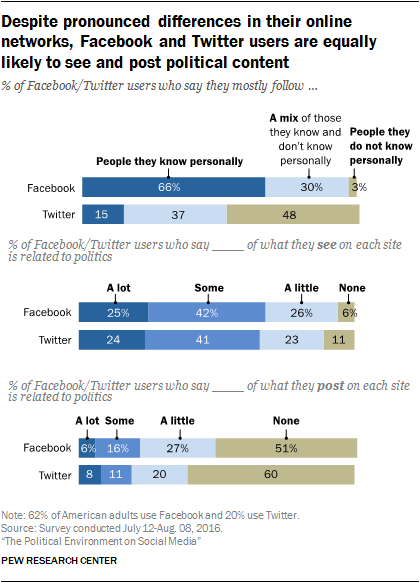
In a political environment defined by widespread polarization and partisan animosity, even simple conversations can go awry when the subject turns to politics. In their in-person interactions, Americans can (and often do) attempt to steer clear of those with whom they strongly disagree.
But online social media environments present new challenges. In these spaces, users can encounter statements they might consider highly contentious or extremely offensive – even when they make no effort to actively seek out this material. Similarly, political arguments can encroach into users’ lives when comment streams on otherwise unrelated topics devolve into flame wars or partisan bickering. Navigating these interactions can be particularly fraught in light of the complex mix of close friends, family members, distant acquaintances, professional connections and public figures that make up many users’ online networks.
A new Pew Research Center survey of U.S. adults finds that political debate and discussion is indeed a regular fact of digital life for many social media users, and some politically active users enjoy the heated discussions and opportunities for engagement that this mix of social media and politics facilitates. But a larger share expresses annoyance and aggravation at the tone and content of the political interactions they witness on these platforms. Among the key findings of this survey:
More than one-third of social media users are worn out by the amount of political content they encounter, and more than half describe their online interactions with those they disagree with politically as stressful and frustrating
The roughly two-thirds of American adults who use social media sites express a relatively wide range of opinions on the political interactions they witness and take part in on these platforms. Many feel overloaded by political content and view their social media interactions with those they disagree with as a source of frustration and annoyance. At the same time, a substantial minority of users enjoy the ability to consume political content and engage in discussions with people on the other side of issues:
- Nearly twice as many social media users say they are “worn out” by the amount of political content they see in their feeds (37%) as say they like seeing lots of political information (20%). Still, about four-in-ten (41%) indicate that they don’t feel particularly strongly one way or the other about the amount of political content they encounter on social media.
- 59% say their social media interactions with those with opposing political views are stressful and frustrating – although 35% find them interesting and informative.
- 64% say their online encounters with people on the opposite side of the political spectrum leave them feeling as if they have even less in common than they thought – although 29% say they end these discussions feeling that they have more in common than they might have anticipated.
Many users view the tone of political discussions on social media as uniquely angry and disrespectful – although a sizeable share feels that these discussions simply reflect the broader political climate

When asked how they view the tone of the political discussions they see on social media, a substantial share of social media users feel these platforms are uniquely angry and disrespectful venues for engaging in political debate. Some 40% of users agree strongly with the notion that social media are places where people say things while discussing politics that they would never say in person (an additional 44% feel that this statement describes social media somewhat well).
Meanwhile, roughly half of users feel the political conversations they see on social media are angrier (49%), less respectful (53%) and less civil (49%) than those in other areas of life. At the same time, a notable minority feels that the political discussions they see on social media are largely reflective of the political discussions they witness in other areas of their lives: For instance, 39% of users feel that these interactions are no more less respectful than other political interactions they encounter. And a small share finds political debates on social media to be more civil (7%), more informative (14%) and more focused on important policy issues (10%) than those they see elsewhere.
Most users try to ignore political arguments on social media as best they can; when that fails, they take steps to curate their feeds and avoid the most offensive types of content
For the most part, social media users try to refrain from engaging with the political arguments that enter their feeds: 83% of them say that when their friends post something about politics that they disagree with they usually just try to ignore it, while 15% usually respond to these posts with a post or comment of their own.
When ignoring problematic content fails, social media users tend to utilize technological tools to remove troublesome users from their feeds entirely. Nearly one-third of social media users (31%) say they have changed their settings in order to see fewer posts from someone in their feed because of something related to politics, while 27% have blocked or unfriended someone for that reason. Taken together, this amounts to 39% of social media users – and 60% of them indicate that they took this step because someone was posting political content that they found offensive.
Despite these annoyances, some users – especially those with high levels of political engagement – enjoy talking, debating and posting about political issues on social media
Yet for all of the tensions and annoyances that accompany political debates on social media, some users do see a good side to these interactions. This is especially true of those Americans who indicate a high level of interest and involvement in the political process more broadly.
These highly engaged social media users express many of the same frustrations about the tone and tenor of political discussions on social media – but many of them simultaneously view social media platforms as valuable tools for political action and discussion. Roughly one-in-five politically engaged users (19%) indicate that they often comment, discuss or post about political issues with others on social media (just 6% of less politically engaged users post with this level of frequency). And nearly one-third of these politically engaged users feel that social media sites do “very well” at bringing new voices into the political discussion (31%) or helping people get involved with issues that matter to them (30%).
Frustration over politically oriented social media discussions is a bipartisan phenomenon
Even as their overall political attitudes differ dramatically, Democrats and Republicans (including independents and other nonpartisans who “lean” toward either party) tend to view and utilize social media in largely comparable ways. For instance, they are equally likely to say that they comment, post about or engage in political discussions on social media (10% of Republican users and 8% of Democrats do so often). And a nearly identical share from each party feels worn out by the amount of political material they encounter on social media (38% of Democrats and 37% of Republicans who use social media report this) or feel that the conversations they see on social media are angrier and less civil than in other venues where these conversations occur. However, Democrats who use social media are somewhat more likely to view these sites as useful vehicles for bringing new voices into the political arena.
Political content is as prevalent on Facebook (where users mostly follow people they know personally) as it is on Twitter (where users tend to follow a wider mix of connections)

The concerns and frustrations outlined above are occurring in a broader context: namely, one in which political discussions are encroaching into a range of different social spaces. Two of the more common social media platforms – Facebook and Twitter – are illustrative in this regard. Facebook users tend to be friends primarily with people they know personally (66% of Facebook users say they mostly follow people they already know), while Twitter users are much more likely to follow people they do not know personally (48% of Twitter users indicate that most of the people they follow are in this category). And a large share of Facebook and Twitter users report that they follow a relatively broad mix of people with differing political views and opinions (indeed, just 23% of Facebook users and 17% of Twitter users say that they mostly follow people with political views that are similar to theirs). But despite these differences in the social and political composition of their networks, an identical share of Facebook users and Twitter users report that they frequently encounter political posts and engage in political discussions among the people in their networks.